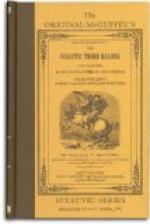13. On the deck the Rover takes his stand,
So dark it is they see no
land.
Quoth Sir Ralph, “It
will be lighter soon,
For there is the dawn of the
rising moon.”
14. “Canst hear,” said one, “the
breakers roar?
For methinks we should be
near the shore.”
“Now where we are I
can not tell,
But I wish I could hear the
Inchcape Bell.”
15. They hear no sound, the swell is strong;
Though the wind hath fallen,
they drift along,
Till the vessel strikes with
a shivering shock:
Cried they, “It is the
Inchcape Rock!”
16. Sir Ralph the rover tore his hair,
He curst himself in his despair;
The waves rush in on every
side,
The ship is sinking beneath
the tide.
17. But even in his dying fear
One dreadful sound could the
Rover hear,
A sound as if with the Inchcape
Bell
The fiends below were ringing
his knell.
Definitions.—l. Keel, the principal timber in a ship, extending from bow to stern, at the bottom. 3. Buoy (pro. bwoi) a float-ing mark to point out the position of rocks, etc., beneath the water. 4. Surge, a large wave. 6. Joy’ance, gayety. 11. Scoured, roved over, ranged about. Store, that which is massed together. 14. Me-thinks’, it seems to me. 17. Fiends (pro. fends). evil spirits. Knell (pro. nel), the stroke of a bell rung at a funeral or at the death of a person.
Notes.—The above poem was written at Bristol, England, in 1802, and recounts an old tradition. 2. The Inchcape Rock is at the entrance of the Frith of Tay, Scotland, about fifteen miles from shore.
LXXXIX. MY MOTHER’S GRAVE. (253)
1. It was thirteen years since my mother’s death, when, after a long absence from my native village, I stood beside the sacred mound beneath which I had seen her buried. Since that mournful period, a great change had come over me. My childish years had passed away, and with them my youthful character. The world was altered, too; and as I stood at my mother’s grave, I could hardly realize that I was the same thoughtless, happy creature, whose checks she so often kissed in an excess of tenderness.
2. But the varied events of thirteen years had not effaced the remembrance of that mother’s smile. It seemed as if I had seen her but yesterday—as if the blessed sound of her well-remembered voice was in my ear. The gay dreams of my infancy and childhood were brought back so distinctly to my mind that, had it not been for one bitter recollection, the tears I shed would have been gentle and refreshing.
3. The circumstance may seem a trifling one, but the thought of it now pains my heart; and I relate it, that those children who have parents to love them may learn to value them as they ought. My mother had been ill a long time, and I had become so accustomed to her pale face and weak voice, that I was not frightened at them, as children usually are. At first, it is true, I sobbed violently; but when, day after day, I returned from school, and found her the same, I began to believe she would always be spared to me; but they told me she would die.




